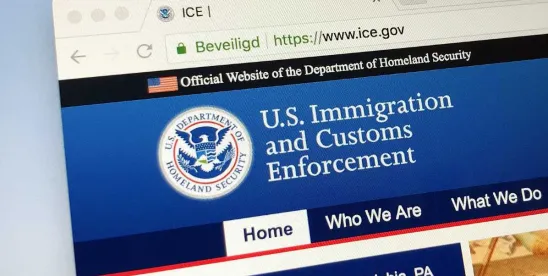On January 20, 2025, President Trump signed numerous executive orders related to his immigration policy objectives, including a declaration of a national emergency at the southern border, which will allow the use of federal funding for border security and the deployment of armed forces to the region as additional resources. President Trump will also enact a mass deportation operation of undocumented immigrants in the U.S. and has vowed to initiate “the largest domestic deportation operation in American history.”
As part of this operation, there is speculation that the U.S. Immigration and Customs Enforcement (ICE) agency, the enforcement branch of the U.S. Department of Homeland Security (DHS), is preparing to take removal actions (informally known as “ICE raids”) in targeted cities. However, the actual date of the operation is unclear. As of the date of publication of this Insight, there has been no significant increase in the number of ICE raids or arrests across the country. Nevertheless, with the new administration’s emphasis on immigration enforcement across all federal agencies, we expect to see an increase in ICE raids imminently.
On January 21, 2025, the Acting Secretary of the DHS, Benjamine Huffman, issued a directive ending the Biden administration’s policy restricting immigration enforcement in or near “protected areas.” This means that ICE agents will have the authority to enter sensitive areas, including hospitals, schools, and churches, and take enforcement actions.
What Happens During an ICE Raid?
In an ICE raid, the agency’s objective is to detain undocumented employees working for employers in the United States. ICE raids are generally targeted, meaning ICE agents may have a list of names of individuals they are looking to detain, or alternatively, the raid may be targeted towards a particular industry that is known to have a high volume of undocumented employees, such as restaurants and the hospitality, construction, cleaning, and agriculture industries.
ICE raids are not announced in advance. Rather, ICE agents are free to enter any public areas of the business, such as a lobby or parking lot. However, in order to enter non-public business premises, the agent must have a signed judicial search warrant or the employer’s consent.
It is important for employers to comply with these investigations to maintain the integrity of their overall immigration programs. However, due to the unannounced nature of ICE raids and the sensitive nature of the information about employees and the company that may be sought, employers must take care not to inadvertently violate laws or privacy protections in their efforts to comply with ICE agents’ requests.
What Can Employers Do Now to Prepare for ICE Raids?
There are several steps an employer can and should take to prepare for a potential ICE raid.
- Designate a person within the Human Resources or Legal Department to be the primary point of contact in case of an ICE raid.
- Establish basic protocols for the designated company representative to follow in the event of an ICE raid. Also consider providing training to designated company representatives regarding the employer’s records and retention policy, what to expect during an ICE raid, and how to respond (e.g., reviewing the scope of judicial search warrants, communicating with agents and/or affected employees, etc.).
- Prepare guidelines or instructions for your front desk receptionist or whomever else is likely to be the first person an ICE agent might come across and speak to so that the person knows who to contact in case an ICE agent enters your business location, as well as what not to do or say.
- Conduct an internal audit of I-9 files. In this connection:
- retain a completed Form I-9 for all active employees,
- make corrections to Forms I-9 as soon as an error is identified, and
- also retain I-9s for the mandatory period for terminated employees.
- If you are an E-Verify employer:
- conduct an audit of your E-Verify cases to ensure compliance,
- submit an E-Verify case for one you identify as missing, and
- make sure the mandatory E-Verify poster is posted at all worksites.
- Conduct an internal audit to ensure immigration petition documents are in line with personnel records, including compensation and work location information.
- Conduct a review of employee personnel, I-9, and immigration files and ensure the respective files are kept in separate folders and contain only relevant documents.
- Remove or relocate documents that may disclose employees’ personal or protected data and that are not otherwise required to be maintained in the file.
- Be mindful, however, of any applicable state personnel file laws that dictate what must be maintained as part of a “personnel file.”
- If you have contractors, leased workers, or workers from a temporary staffing agency providing services at your business location(s), review your vendor contract for language requiring the vendor to:
- provide contractors who are legally authorized to work in the United States, and
- be fully compliant with the I-9 laws and other relevant immigration laws.
- Notify managers/supervisors that they must not provide legal advice to employees or customers who are at the business premises and may be affected by immigration enforcement measures.
- Instead, employers may wish to make available pamphlets or other literature regarding immigrant rights from immigration support organizations such as the National Immigration Law Center.
- In light of the potentially high-profile nature of ICE raids, employers may wish to get ahead of any potential negative press by preparing a statement to be issued to employees and/or the media following an ICE raid.
- Connect with an attorney specializing in immigration law to seek guidance on establishing internal protocols and training.
What Else Should Employers Know?
The current Trump administration’s immigration enforcement efforts will likely primarily target undocumented immigrants with criminal histories as well as undocumented immigrants at the southern border. But we may also see additional executive orders affecting policy changes impacting individuals currently protected under programs such as Deferred Action for Childhood Arrivals, Temporary Protected Status, Deferred Enforced Departure, foreign students on F-1 student visas, and humanitarian parole programs established during the Biden administration. We may also see an increase in DHS site visits to employers’ business locations in order to conduct routine audits of immigration visa sponsorship files that have been filed with the immigration agency. Employers that serve members of the public, such as hospitals, schools, and religious organizations, should also be aware that they are generally under no obligation to share the immigration status (if known) of their patients, parishioners, customers, or students unless such information is specifically included in a government agent’s lawful warrant. Relatedly, however, employers should be careful not to be seen as obstructing or interfering in any way with the government’s actions.






 />i
/>i
